MGMT 3000 Guhde Exam 3
1/155
There's no tags or description
Looks like no tags are added yet.
Name | Mastery | Learn | Test | Matching | Spaced | Call with Kai |
|---|
No analytics yet
Send a link to your students to track their progress
156 Terms
what follows planning?
organizing the vertical structure
srategy defines _________ , organizing defines _____________
how to achieve goals; how it will be done in terms of resources
organization structure includes (3)
1. set of formal tasks assigned to individuals/departments
2. formal reporting relationships
3. design of systems to ensure effective coordination of employees across departments
division of labor
degree to which organizational tasks are subdivided into separate jobs; also called worker specialization
work specialization/division of labor is a component of...
weber's bureaucracy and fayol's general principles of management
chain of command
unbroken line of authority that links all employees in an org and who reports to whom
authority is the formal and legitimate right of a manager to do what three things?
1. make decisions
2. issue orders
3. allocate resources to achieve outcomes/goals
3 characteristics of authority
1. vested in organizational positions, not people
2. flows down the vertical hierarchy
3. accepted by subordinates
line authority
managers have formal authority to direct and control immediate subordinates; connected via a line on the org chart
line departments
perform tasks that reflect the organization's mission; generate revenue
in most restaurants, which would be a line positon
servers and cooks
staff authority
authority that includes right to advise, recommend, and counsel in the staff's specialists' area of expertise
staff departments
support line departments; cost center
span of management
number of employees reporting to a supervisor
less supervision (larger spans of control) depends on... (8)
1. work is stable/routine
2. subordinates perform similar work
3. subordinates are in one location
4. subordinates are highly trained
5. rules and procedures are defined
6. support systems and personnel are available
7. few nonsupervisory activities
8. manager prefers a large span
tall structure
span of management is narrow and therefore has many hierarchical levels; many levels of management
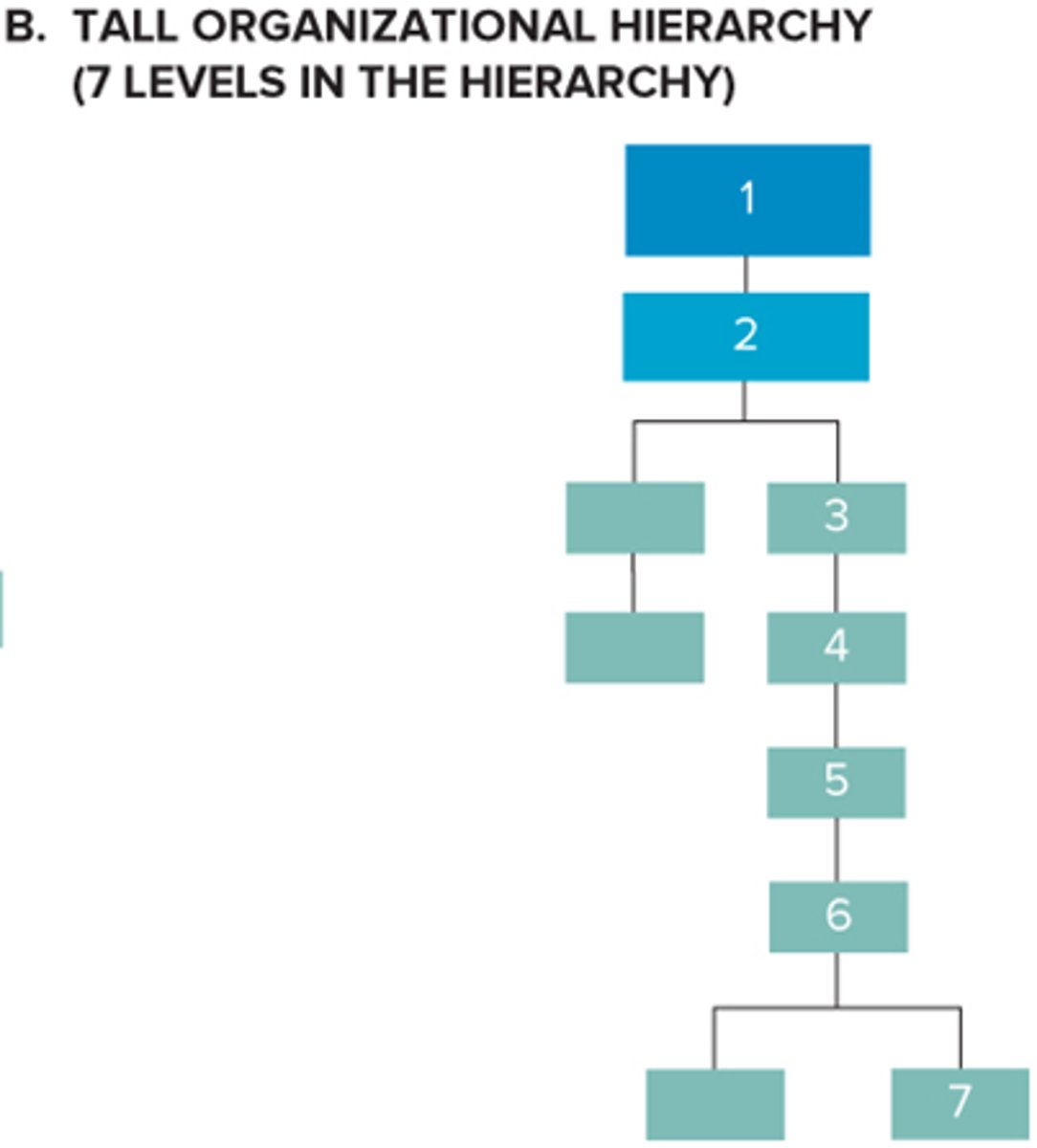
flat structure
span of management is wide and therefore has few hierarchical levels; fewer layers of management
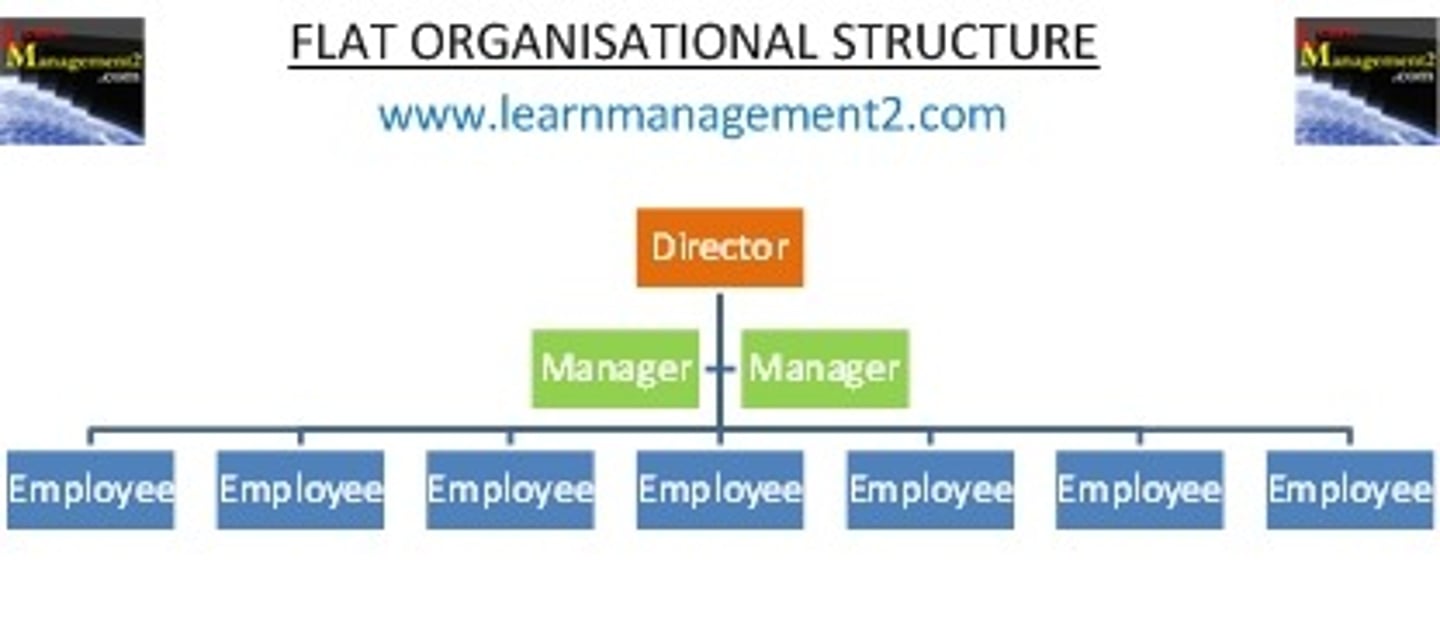
major distinction b/t tall and flat structure
tall structure has more managers even with the same number of employees as a flat structure
what determines whether an organization is flat or tall?
span of management
centralization
decision authority is located near the top of the organization
decentralization
decision authority is pushed downward to lower organization levels
what two things in the environment are associated with decentralization?
rapid change and uncertainty
what requires centralization?
crisis
departmentalization
basis for grouping positions into departments and departments into the total org
5 approaches of departmentalization
1. functional
2. divisional
3. matrix
4. team
5. virtual network
vertical functional approach
positions grouped into departments based on similar skills, expertise and resource use
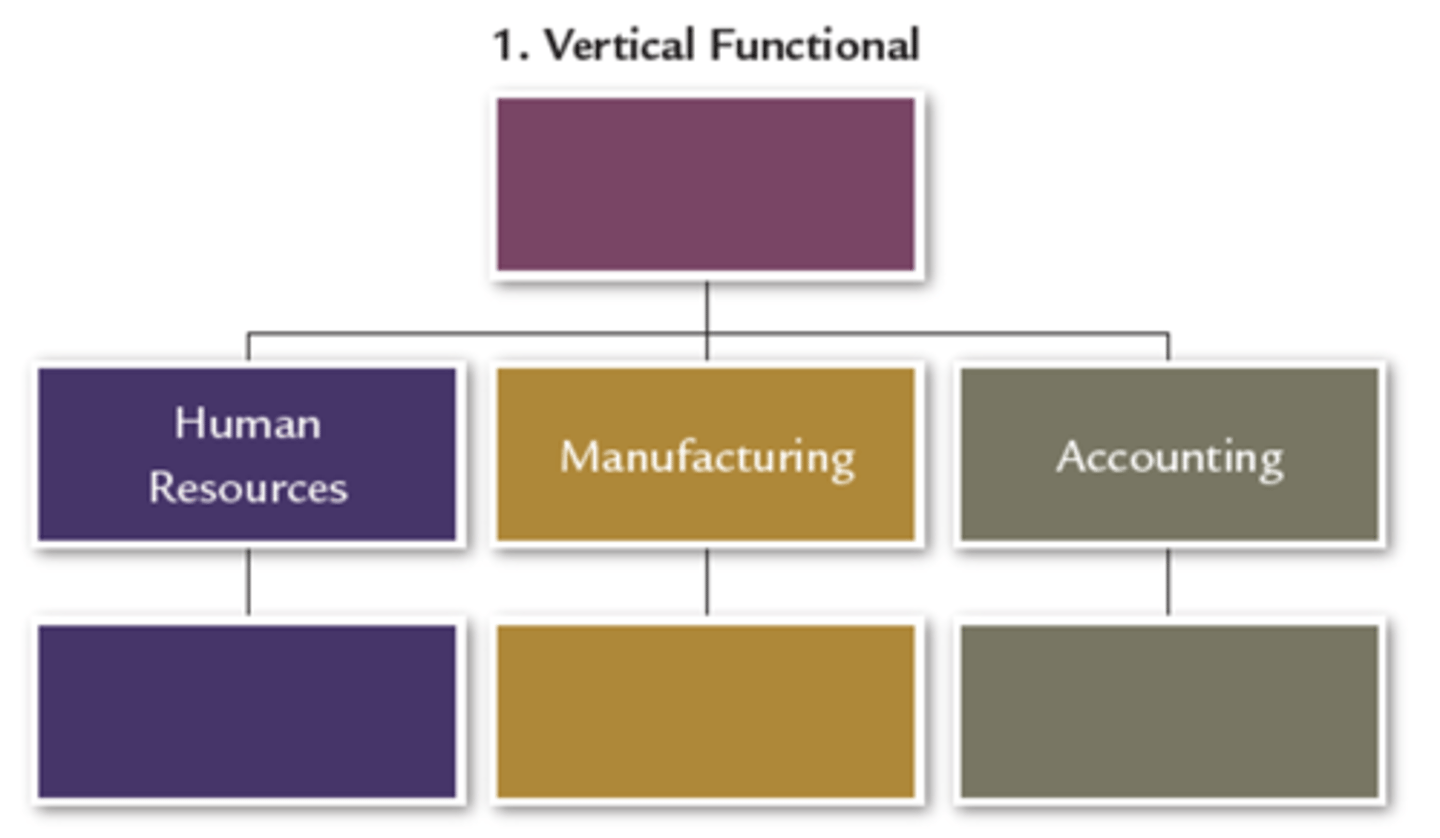
divisional approach
departments are grouped together based on similar organizational outputs such as product/service or geographic factors

matrix approach
combines aspects of both functional and divisional structures simultaneously, in the same part of the organization; improved coordination and information
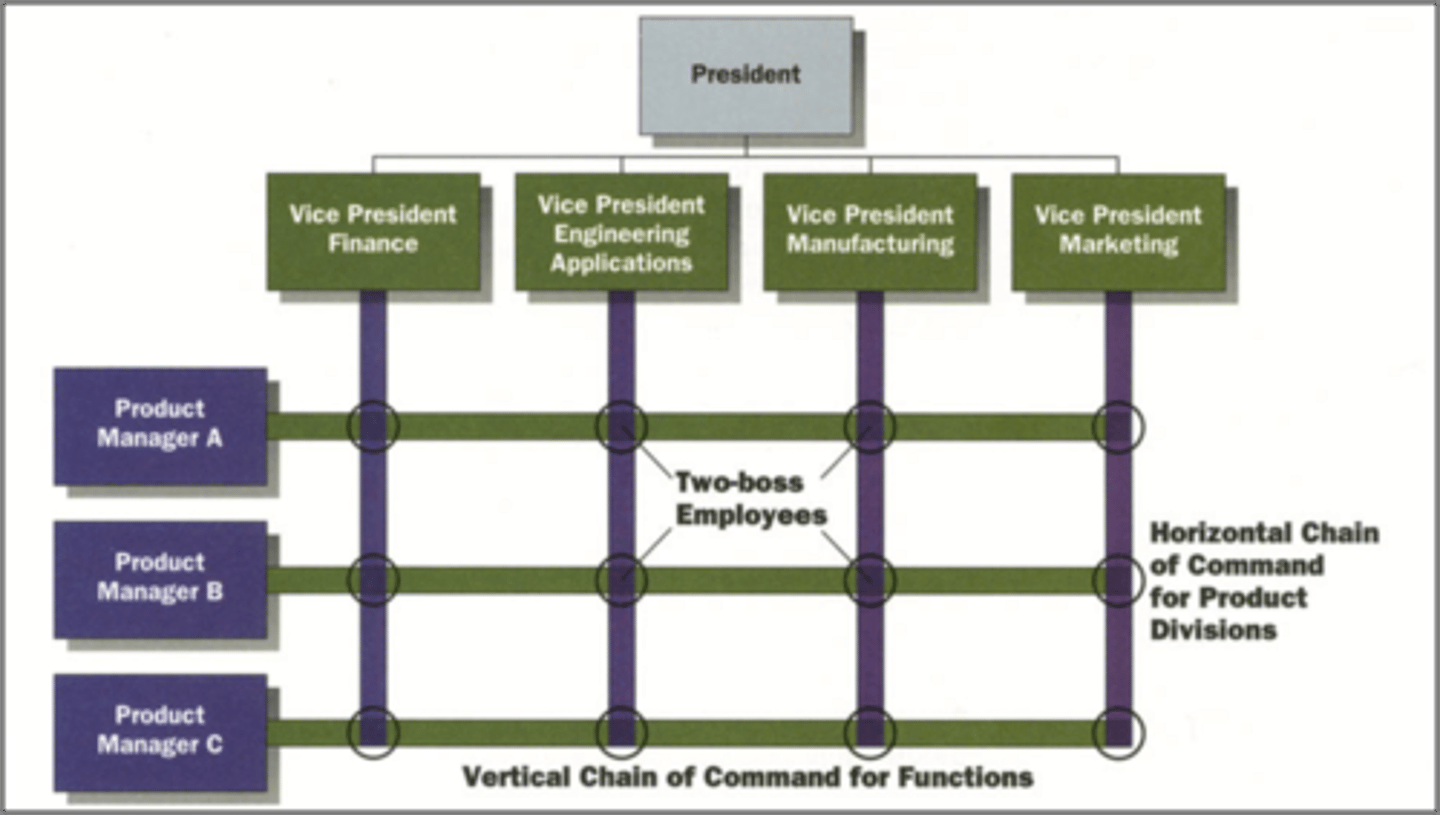
would henri fayol approve of the matrix approach?
no, it violates unity of command
the matrix approach creates...
inefficiency because it is hard to report to two people at the same time
team approach
cross-functional teams: consist of employees from various functional departments who are responsible to meet as a team and resolve mutual problems
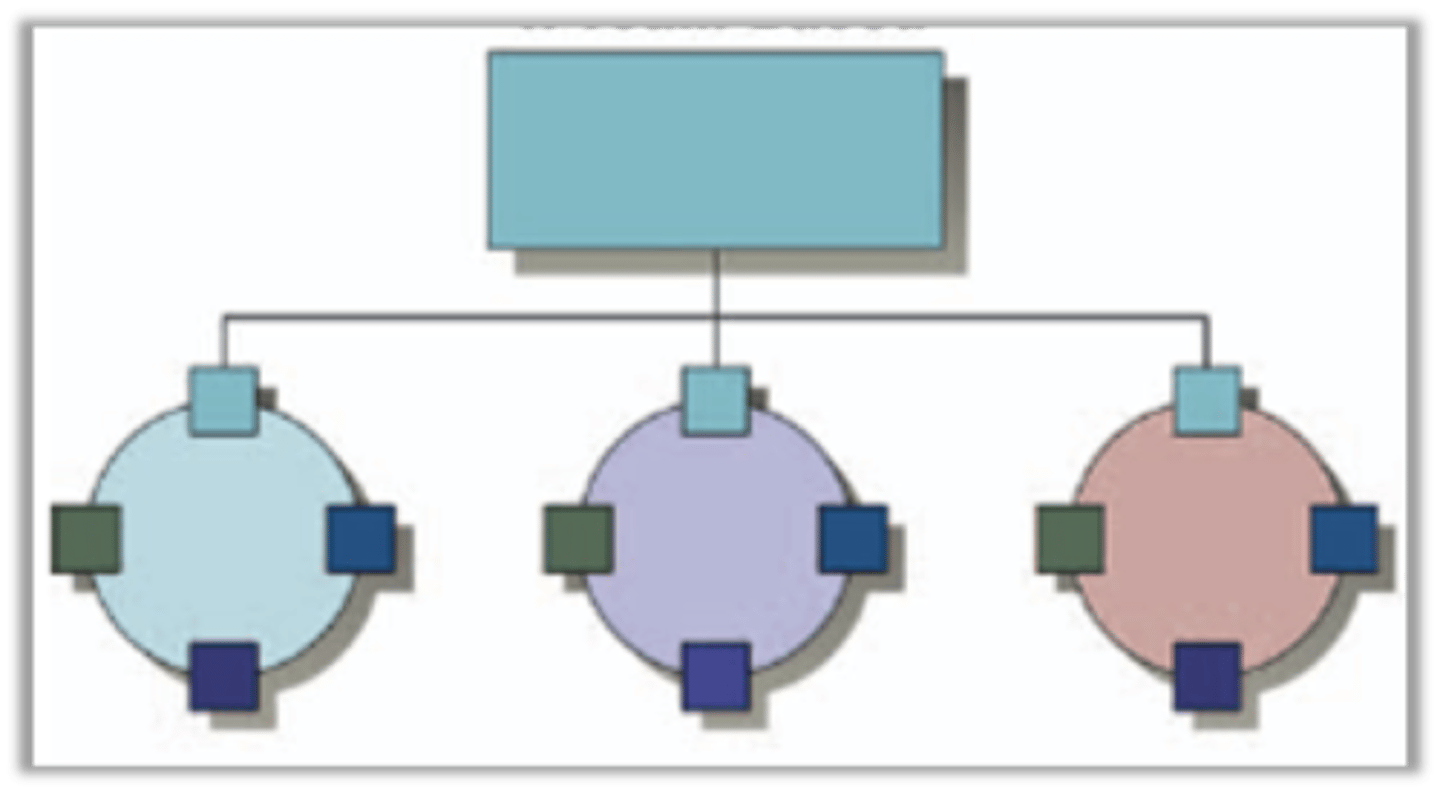
network approach
a company can concentrate on what it does best and contract out other activities to companies with distinctive competence in those specific areas, which enables a company to do more with less
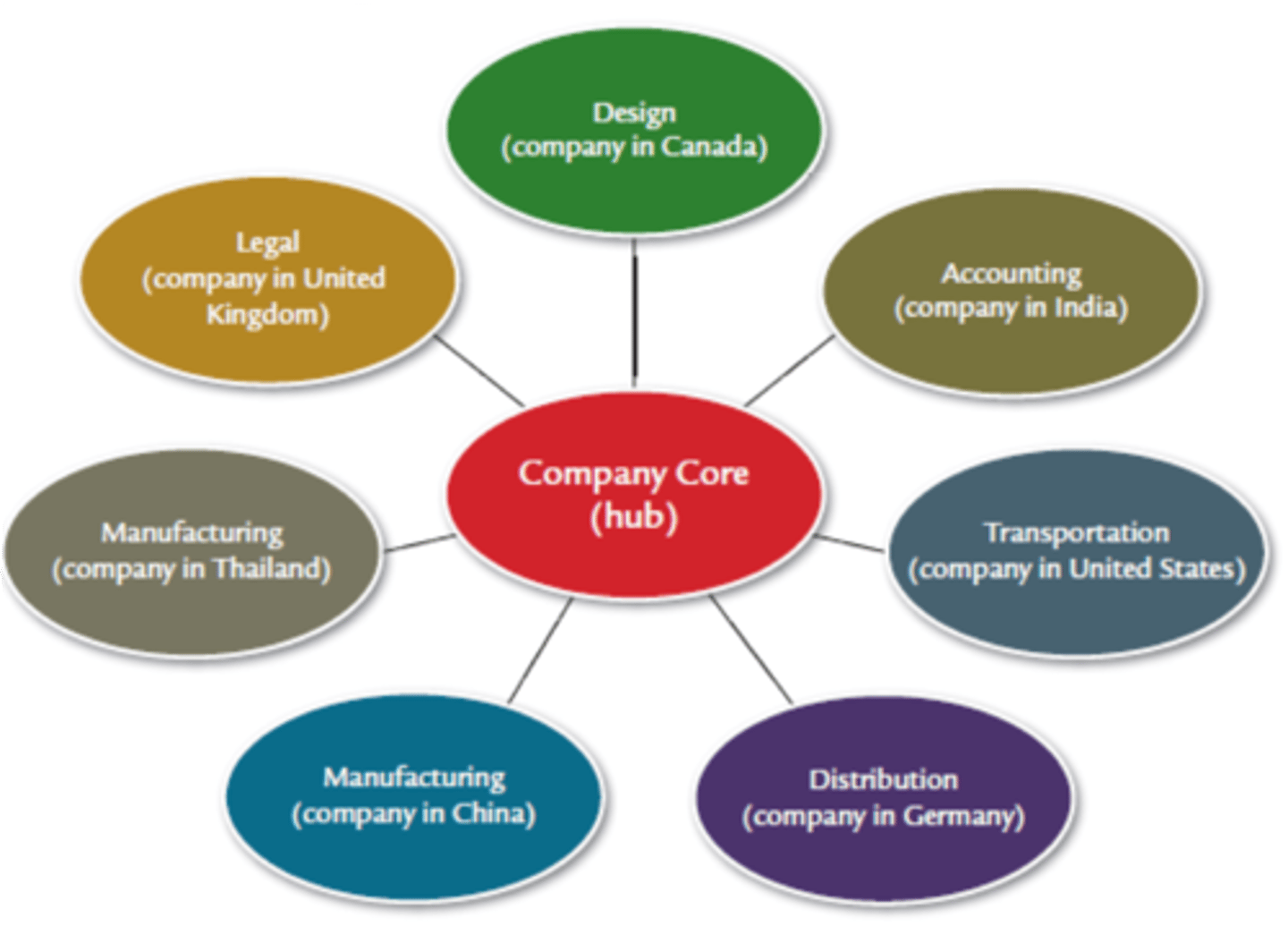
once people are departmentalized into separate departments, there is a need for...
coordination
coordination
managerial task of collaborating across department
collaboration
join effort b/t people from two or more departments to produce outcomes that meet a common goal or shared purpose and that are typically greater than what could be achieved working alone - to achieve synergy
human capital
economic value of the combined knowledge, experience, skills, and capabilities of employees
per drucker, our economy has shifted from a dependence on...
workers who do manual labor to knowledge workers
strategic role of human resource management (2)
1. HR drives organizational performance
2. human capital cited as the top factor in competitive success
top 3 factors for maintaining competitive success
1. human capital - 71%
2. customer relationships - 66%
3. product/service innovation - 52%
3 HRM-related strategic issues for managers
1. hiring the right people to become more competitive on a global basis
2. hiring the right people for improving quality, innovation, and customer service
3. knowing the right people to retain after mergers, acquisitions, or downsizing
human capital as a source of competitive advantage (3)
1. human capital value
2. rareness
3. immutability
strategic human resource management goals
1. attract - finding the right people
2. maintain - maintain an effective workforce
3. motivate - manage talent
affirmative action
requires employers to take positive steps to guarantee equal employment opportunities for people within protected groups
equal employment opportunity commission (EEOC)
created to assist orgs and employees in the understanding and enforcement of employment law
employment law exists at what level of gov?
federal, state, and local
what is the most significant law regarding EEO?
title VII of the civil rights act of 1964
title VII of the civil rights act of 1964
forbids discrimination on the basis of sex, race, color, religion, or national origin in all areas of the employment relationship
what does sex include?
pregnancy, sexual identity, and sexual orientation
sexual harassment in the workforce is an important concern of everyone in the workplace. any incidence of sexual harassment is a violation of the...
title VII of the civil rights act of 1964
family and medical leave act
requires employers to provide up to 12 weeks of unpaid leave for childbirth, adoptions, or family emergencies
equal pay act
prohibits gender-based differences in pay for substantially equal work
patient protection and affordable care act
firms with 50+ employees must give their employees healthcare or get a fee; prevents insurers from denying coverage based on preexisting; aka obamacare
social contract b/t employer & employee 50 years ago
-trend was that employees stayed in the same job in the same company for their entire career
-companies rewarded employees' loyalty by offering job stability, a decent wage, and benefits
social contract b/t employer & employee today
-more mobile, less loyal, and more diverse
-in part shaped by the gig/1099 economy (ex. uber driver)
blind hiring
managers focus on an applicant's job skills and performance rather than educational credentials, appearance, or prior experience
what can be used to reduce bias in hiring deicisons?
AI
4 common HR tasks ChatGPT can do
1. generate relevant interview questions
2. provide real-time support to new hires by answering questions about company policies, procedures, benefits
3. send announcements and reminders to employees
4. develop employee surveys
nearly ______ use AI to support HR-related activities; ______ of these companies use AI for recruiting and hiring purposes
1 in 4; 80%
why did amazon eliminate their AI recruiting tool?
it discriminated against women; learned bias from different sources
employer brand
promoting an org as a highly desirable place to work
matching model
match b/t what the org has to offer and the needs of the individual
in the matching model, jobs are characterized by their...
requirements and rewards
in the matching model, individuals are characterized by their...
qualifications (KSAOs) and motivation
4 steps to attracting an effective workforce
1. HR planning
2. recruiting source
3. selection
4. new employee
HR planning
forecasting of HR needs and the projected matching of individuals with expected job vacancies
HR planning - 3 questions
1. what new technologies are emerging, and how will these affect the work system and employees needed?
2. how is the volume of the business likely to change in the next five to ten years?
3. what is the turnover rate, is any avoidable?
job analysis
systematic process of gathering/interpreting info about the essential duties, tasks, responsibilities, and context of a job
develop the ______ based on the job analysis
job posting
realistic job preview (RJP)
gives applicants all pertinent/realistic info about the job and the org; contributes to employee satisfaction and reduces turnover bc RJPs facilitate matching people to positions
3 most frequently used selection devices
1. application form
2. interview
3. employment test
about _____ of recruiters use video technology in the interview process
60%
one-way video interview platforms
receive questions on the screen and then record answers
2 advantages of one-way video interview platforms
1. save companies and candidates' time
2. help eliminate human bias
structured interview
set of standardized questions that are asked of every applicant so comparisons can easily be made
behavioral questions
ask people to describe how they have performed a certain task or handled a particular problem
training and development is extra important to...
knowledge workers
training
teaching employee the skills, abilities, and knowledge to perform current job
development
developing employees for future promotions
performance maangement
observing/evaluating employee performance, recording assessments, and providing feedback
compensation
all direct and indirect financial payments plus all awards given to employees
hourly employees are entitled to...
overtime
pay-for-performance
higher performance = higher pay raise; motivates employees
across-the-board
everyone gets the same pay increase; rewards low performers
4 benefits required by law
1. social security
2. unemployment compensation
3. workers' compensation
4. health insurance
additional benefits
offered to attract and maintain an effective workforce (ex. vacation, holidays, retirement, educational reimbursement, etc)
exit interviews
can be used to learn about dissatisfaction and the reason for departure
diversity of thought
aka cognitive diversity; achieved when a manager creates a heterogenous team made up of individuals with diverse characteristics who bring different ideas, viewpoints, and ways of thinking/reasoning
5 factors shaping personal bias
1. unconscious bias
2. prejudice
3. discrimination
4. stereotypes
5. ethnocentrism
unconscious bias
attitudes/stereotypes that affect our understanding/actions without our conscious knowledge
prejudice
tendency to view people who are different as being deficient
discrimination
acting out prejudicial attitudes toward other people who are targets of an individual's prejudice
stereotypes
rigid, exaggerated, irrational belief associated with a particular group of people
ethnocentrism
belief that one's own group/culture is inherently superior to other groups/cultures
monoculture
a culture that accepts only one way of doing things and one set of values/beliefs
ethnorelativism
belief that groups/subcultures are inherently equal
pluralism
environment in which the org accommodates several subcultures
glass ceiling
invisible barrier that exists for women that limits their upward mobility in orgs
do we need a law to get rid of the gender wage gap?
no, there are already 3
women's leadership style might be better managers because...
of a more collaborative, less hierarchical, relationship-oriented approach in tune with today's global and multicultural environment
companies believe that diversity initiatives have many benefits (5)
1. maintain competitive advantage
2. improve employee morale
3. decrease interpersonal conflict
4. facilitate progress in new markets
5. increase creativity